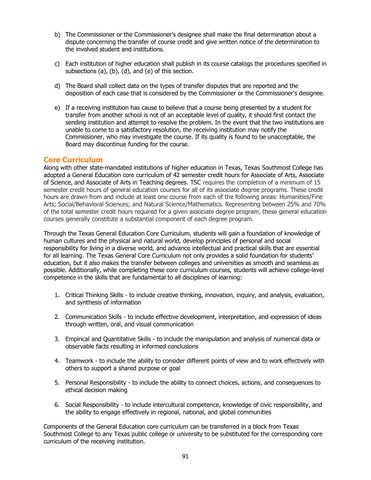b) The Commissioner or the Commissioner's designee shall make the final determination about a dispute concerning the transfer of course credit and give written notice of the determination to the involved student and institutions. c) Each institution of higher education shall publish in its course catalogs the procedures specified in subsections (a), (b), (d), and (e) of this section. d) The Board shall collect data on the types of transfer disputes that are reported and the disposition of each case that is considered by the Commissioner or the Commissioner's designee. e) If a receiving institution has cause to believe that a course being presented by a student for transfer from another school is not of an acceptable level of quality, it should first contact the sending institution and attempt to resolve the problem. In the event that the two institutions are unable to come to a satisfactory resolution, the receiving institution may notify the Commissioner, who may investigate the course. If its quality is found to be unacceptable, the Board may discontinue funding for the course.
Core Curriculum Along with other state-mandated institutions of higher education in Texas, Texas Southmost College has adopted a General Education core curriculum of 42 semester credit hours for Associate of Arts, Associate of Science, and Associate of Arts in Teaching degrees. TSC requires the completion of a minimum of 15 semester credit hours of general education courses for all of its associate degree programs. These credit hours are drawn from and include at least one course from each of the following areas: Humanities/Fine Arts; Social/Behavioral Sciences; and Natural Science/Mathematics. Representing between 25% and 70% of the total semester credit hours required for a given associate degree program, these general education courses generally constitute a substantial component of each degree program. Through the Texas General Education Core Curriculum, students will gain a foundation of knowledge of human cultures and the physical and natural world, develop principles of personal and social responsibility for living in a diverse world, and advance intellectual and practical skills that are essential for all learning. The Texas General Core Curriculum not only provides a solid foundation for students’ education, but it also makes the transfer between colleges and universities as smooth and seamless as possible. Additionally, while completing these core curriculum courses, students will achieve college-level competence in the skills that are fundamental to all disciplines of learning: 1. Critical Thinking Skills - to include creative thinking, innovation, inquiry, and analysis, evaluation, and synthesis of information 2. Communication Skills - to include effective development, interpretation, and expression of ideas through written, oral, and visual communication 3. Empirical and Quantitative Skills - to include the manipulation and analysis of numerical data or observable facts resulting in informed conclusions 4. Teamwork - to include the ability to consider different points of view and to work effectively with others to support a shared purpose or goal 5. Personal Responsibility - to include the ability to connect choices, actions, and consequences to ethical decision making 6. Social Responsibility - to include intercultural competence, knowledge of civic responsibility, and the ability to engage effectively in regional, national, and global communities Components of the General Education core curriculum can be transferred in a block from Texas Southmost College to any Texas public college or university to be substituted for the corresponding core curriculum of the receiving institution. 91


